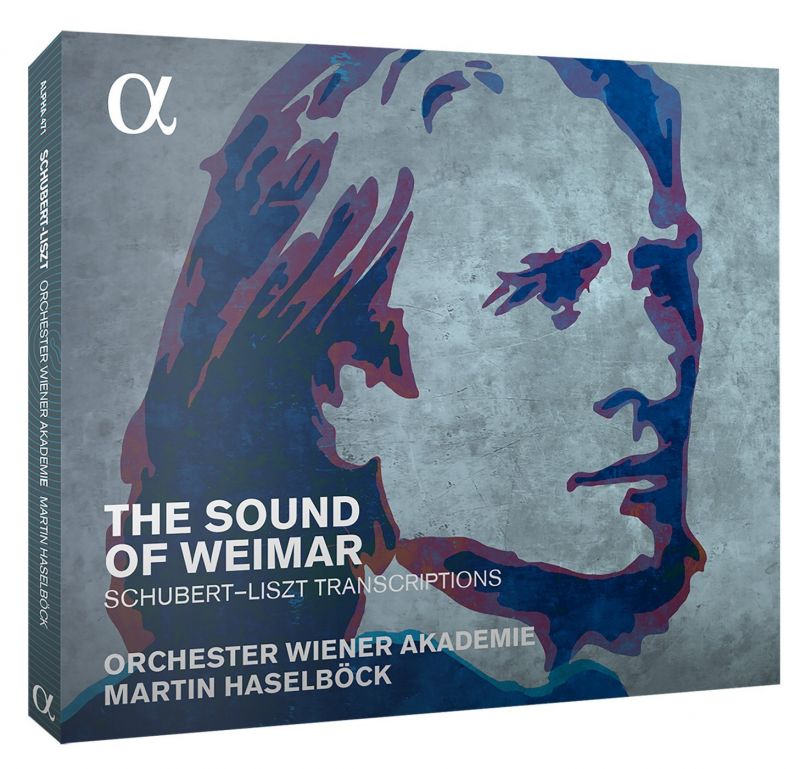LISZT; SCHUBERT The Sound of Weimar
View record and artist detailsRecord and Artist Details
Composer or Director: Franz Liszt, Franz Schubert
Genre:
Orchestral
Label: CPO
Magazine Review Date: 01/2016
Media Format: CD or Download
Media Runtime: 77
Mastering:
DDD
Catalogue Number: ALPHA471

Tracks:
| Composition | Artist Credit |
|---|---|
| (2) Marches caractéristiques, Movement: Reitermarsch |
Franz Schubert, Composer
Franz Schubert, Composer Martin Haselböck, Conductor Vienna Academy Orchestra |
| (6) Grandes marches, Movement: Trauermarsch |
Franz Schubert, Composer
Franz Schubert, Composer Martin Haselböck, Conductor Vienna Academy Orchestra |
| Divertissement à la Hongroise |
Franz Schubert, Composer
Franz Schubert, Composer Martin Haselböck, Conductor Vienna Academy Orchestra |
| Fantasy, 'Wandererfantasie' |
Franz Schubert, Composer
Franz Schubert, Composer Martin Haselböck, Conductor Vienna Academy Orchestra |
| (3) Odes funèbres, Movement: La notte, after Michelangelo |
Franz Liszt, Composer
Franz Liszt, Composer Martin Haselböck, Conductor Vienna Academy Orchestra |
| Vexilla regis prodeunt |
Franz Liszt, Composer
Franz Liszt, Composer Martin Haselböck, Conductor Vienna Academy Orchestra |
| (3) Odes funèbres, Movement: Les morts (wds. Lamennais) |
Franz Liszt, Composer
Franz Liszt, Composer Martin Haselböck, Conductor Vienna Academy Orchestra |
Author: Patrick Rucker
His newest offering with Wiener Akademie combines Liszt’s well-known concerto treatment of Schubert’s Wanderer Fantasy, with two of the Trois Odes funèbres and some genuine rarities: the first recording of the still unpublished Vexilla regis prodeunt from 1864 and three of Schubert’s marches for piano duet (D886/1, 819/5 and 818), which Liszt transcribed for orchestra around 1860.
This setting of Vexilla regis, the sixth-century Latin hymn that held such significance for Liszt, is closer in spirit to one of the majestic instrumental movements of Christus than to the nobly austere form it would assume 15 years later in Via Crucis. It is the most interesting and refined performance on the disc.
Gottlieb Wallisch plays an 1851 JB Streicher piano for the Wanderer concerto; and though it is a pleasure to hear the balances discernable using historical instruments, many exquisite details of Liszt’s deft orchestration are simply lost in this rather leaden accompaniment. Listeners as yet unfamiliar with the Trois Odes funèbres would do well to trust their first impressions to the fine 2011 set by Ivan Volkov and the BBC Scottish Symphony Orchestra (Hyperion, 5/11).
Certainly Liszt, the innovative conductor and orchestrator, stands to profit from the best historical instrument performances. Yet one is left wondering what the addition of a strong conductorial point of view might also achieve. Carefully shaped phrasing, blended sonorities and a sure grasp of characteristic yet flexible tempi – in a word, the requisites for trenchant, compelling interpretations of mid-19th-century orchestral literature – would go a long way towards bringing this strikingly beautiful and historically influential music more vividly to life.
Discover the world's largest classical music catalogue with Presto Music.

Gramophone Digital Club
- Digital Edition
- Digital Archive
- Reviews Database
- Full website access
From £8.75 / month
Subscribe
Gramophone Full Club
- Print Edition
- Digital Edition
- Digital Archive
- Reviews Database
- Full website access
From £11.00 / month
Subscribe
If you are a library, university or other organisation that would be interested in an institutional subscription to Gramophone please click here for further information.




